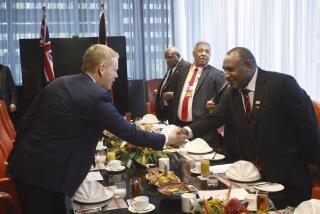U.S., Australia Meet on Wheat, ANZUS
- Share via
SAN FRANCISCO — Top defense and foreign policy officials of Australia and the United States met Sunday to try to rescue their military and political alliance from a growing controversy over subsidized U.S. wheat sales and a festering dispute over New Zealand’s anti-nuclear policy.
Before the two-day session ends late today, Secretary of State George P. Shultz and Defense Secretary Caspar W. Weinberger must reach some kind of agreement with Australian Foreign Minister Bill Hayden and Defense Minister Kim Beazley on how to restructure the ANZUS Pact at probably the most crucial moment in its 35-year history.
The United States virtually expelled New Zealand from the alliance in June after Prime Minister David Lange refused to back down from his policy of refusing to allow port visits by U.S. ships that are nuclear powered or capable of carrying nuclear weapons.
A senior Australian official said his government believes New Zealand acted unreasonably in rejecting U.S. ship visits. Nevertheless, he said, Australia intends to maintain its own cooperative relationship with New Zealand, its closest traditional friend.
The unraveling of ANZUS, an acronym for Australia, New Zealand and the United States, comes at a time of increased Soviet diplomatic activity among the tiny island states of the South Pacific, in effect bringing the superpower rivalry into the ANZUS region for the first time.
Adding to the pressure on the alliance is an increasingly bitter dispute over subsidized U.S. grain sales, a trade practice that Australia protests will damage its farmers.
President Reagan signed an executive order Aug. 1 authorizing the sale of up to 4 million metric tons of wheat to the Soviet Union at U.S.-taxpayer subsidized bargain prices.
Concern Over Dole Bill
Australia objects to that order, but the Canberra government is even more concerned about possible passage of legislation sponsored by Senate Majority Leader Bob Dole (R-Kan.) to require subsidized exports of agricultural commodities to a number of nations, especially China and Japan, in addition to the Soviet Union.
Hayden and Beazley are preaching to the already-converted on that issue because both Shultz and Weinberger opposed the subsidized sale, losing an internal power struggle to Dole, Agriculture Secretary Richard E. Lyng, Treasury Secretary James A. Baker III and Commerce Secretary Malcolm Baldrige.
Opposition political parties in Australia have urged the government to expel U.S. forces from joint military bases there unless Washington backs down on the agriculture issue. But a senior Australian official rejected that idea.
“You can’t just put yourself in a position where you must lose,” the official said. “It is not in our interest to lessen U.S. military capability.”
The Australian official said that his government hopes to settle the New Zealand issue with a sort of double alliance in which Australia would maintain close ties with both New Zealand and the United States.
That may prove awkward because the heart of any alliance is the sharing of intelligence information. Washington now refuses to share information with New Zealand and would object strongly to any back-door passage of intelligence through Australia.
The Australian official said that his government would make sure that no U.S.-generated information is passed along to New Zealand. The U.S. official said Washington accepts that guarantee.
More to Read
Sign up for Essential California
The most important California stories and recommendations in your inbox every morning.
You may occasionally receive promotional content from the Los Angeles Times.










